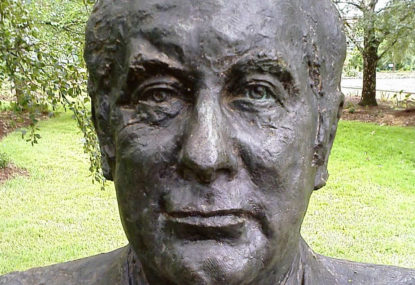JackJumpers' NBL title was special - but where does it sit among Tasmania’s top ten sporting moments?
It’s a pretty good time to be a Tasmanian sports fan right now. After years in the sporting wilderness with not much to celebrate,…

Australia’s 21st Prime Minister was not a noted sports lover. There is no footage of Gough Whitlam getting a facial rearrangement from an errant cricket ball, bowling like a numpty or making his way around the country in lycra and budgie smugglers.
In his household, wife Margaret was the bigger sports nut, the one-time national breaststroke champion representing Australia at the 1938 British Empire Games and destined for the Olympics before World War II got in the way.
According to biographer Jenny Hocking, Whitlam ‘had absolutely no interest in sport either as a participant or viewer’ and only joined his college rowing team because students were expected to be at least a little bit sporty.
“It is, of course, an extraordinarily apt sport for men in public life,” he would say in later years, “because you can face one way while going the other.”
So it’s remarkable that such a non-sporty PM left such a rich Australian sporting legacy, from the grass roots to the international stage.
Universal health care, free university tuition, Aboriginal land rights, no-fault divorce and working sewerage are all well and good.
But six days into his Prime Ministership, Whitlam also banned any racially selected sporting team from touring Australia. So basically South Africa.
Gough Whitlam faces up, while Bob Hawke and Clyde Holding field from behind. pic.twitter.com/ZJdFoH2qwk
— Troy Bramston (@TroyBramston) October 21, 2014
It was a decision that 21 years later was to win us the Sydney Olympics. A big call, I know, but Aussie Olympics boss John Coates can back me up on this.
A few months before Juan Antonio Samaranch spluttered ‘The winner is Sydney’ and Premier John Fahey broke the standing high jump record, the Whitlams (the couple, not the band) visited 13 African countries. Among their many meetings was a private get together with Nelson Mandela.
“It was a very hectic schedule and it was far from five star accommodation,” says Coates. “Both were in their 70s. It was not an easy trip. We did not stay longer than two days in any place.”
Gough’s 1972 actions made all the difference. Where previous Aussie Olympic bids lacked key African support, Coates reckons the Whitlams garnered six or seven votes on their travels. Sydney beat Beijing by two.
We can also thank Gough for all the medals Australia won at those Olympics and, indeed, for a large part of our golden sporting age.
Until Gough came along, the Federal Government didn’t have much of a role in sport. But in his 1972 campaign speech, Gough identified the emerging problem of people sitting on their bums for large chunks of the day.
“There is no greater social problem facing Australia than the good use of expanding leisure,” he said. “It is the problem of all modern and wealthy communities. For such a nation as ours, this may very well be the problem of the 1980s.”
Gough’s sports reforms included the creation of a Department of Tourism and Recreation, along with programs to improve physical fitness levels in schools and the wider community.
Elite sport got a significant boost. There were sports grants on a grand scale, as well as new programs in sports management, coaching, talent identification and sports science and medicine. For the first time, the idea of a national sports institute was floated.
And finally, Gough can take credit for the fact that we don’t sing God Save The Queen when we win all those gold medals.
Never a big fan of the British anthem, Whitlam started a competition to replace it. Of the 1,300 songs entered, Advance Australia Fair got the popular nod and Gough announced it would be our new anthem.
It’s an impressive list of achievements for someone who had no interest in sport. And like so many changes that occurred in that tumultuous three years, we continue to feel the benefits today.